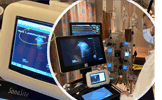Diagnostics
WaveBase builds bridges between AI and ultrasound
March 10, 2021
 KITCHENER, Ont. – WaveBase Inc. has successfully tested a device that connects a range of artificial intelligence (AI) algorithms with existing ultrasound devices. The Canadian firm’s patent-pending technology solves problems for both hospitals and AI companies, as it allows rapid testing and deployment of AI algorithms to ultrasound machines for use at the bedside.
KITCHENER, Ont. – WaveBase Inc. has successfully tested a device that connects a range of artificial intelligence (AI) algorithms with existing ultrasound devices. The Canadian firm’s patent-pending technology solves problems for both hospitals and AI companies, as it allows rapid testing and deployment of AI algorithms to ultrasound machines for use at the bedside.
While point-of-care ultrasound has been growing, especially among non-radiologists, developers have been facing a major hurdle in getting AI to clinicians.
Most manufacturers are only willing to partner with third-party A.I. companies in exclusive arrangements and then only for their newest devices. This approach massively reduces the potential impact of the AI partnership.
WaveBase’s technology enables organizations to test a variety of AI algorithms for ultrasound on a range of devices.
“We ran into this [interoperability] problem first-hand when looking to distribute our arterial and lung AI tools. We decided as a team that if we were having this problem, other AI companies were too. So, we switched gears and began building a bridge that enables functionality and AI equivalency across platforms,” said WaveBase CEO Peter Holmes.
Ultrasound devices have been getting smaller, cheaper and more readily available, which is particularly useful in low-resource settings. Ultrasound has also been critical in the assessment of lung health during the current COVID-19 pandemic for many doctors around the world in the ER and the ICU.
Thanks to its benefits of zero radiation, portability, lower cost, and simplified decontamination procedures it has been an invaluable tool for efficient monitoring and assessment of disease progression.
WaveBase successfully demonstrating their proof of concept test in a clinical setting.
“The timing is right for this technology,” said Dr. Victor Rao, global clinical content manager and POCUS Certification Academy Educator at Inteleos. “The use of POCUS (point-of-care ultrasound) is rapidly expanding amongst new users and innovative applications are being added.”
He further commented, “Having the option to obtain a quick second opinion will raise the comfort level and confidence of new and current users and will enable broader adoption of POCUS. This will empower healthcare professionals to learn, diagnose, and treat patients efficiently while helping to lower healthcare costs and save lives.”
With the support Waterloo MedTech, Velocity, and Communitech, WaveBase has been able to connect with valuable industry expertise, access funding opportunities, and navigate from early concept design to successful integration into a clinical setting.
“WaveBase has the potential to make a real, positive impact on the quality and efficiency of point-of-care diagnostics,” said Shirley Fenton, co-founder of Waterloo MedTech. “We are excited to continue to support them in their efforts to commercialize and achieve broader adoption of this new technology for the benefit of our local MedTech community and the Canadian Healthcare system.”
Since launching their website in January, WaveBase has received three letters of intent from independent AI for ultrasound companies who are working on AI for hematology, hip-dysplasia, thyroid and COVID-19.
“WaveBase streamlines access to AI for ultrasound-wielding clinicians while giving AI developers access to this high-impact market of users.” said Dr. Robert Arntfield, Intensive Care Physician, Co-Author of Point of Care Ultrasound, and CMO of WaveBase. “WaveBase brings AI to the patient bedside to ensure that the most recent developments in deep learning are achieved in real-time to enrich patient care.”
WaveBase is a member of Velocity, Communitech, OBIO, and Waterloo MedTech. With its successfully tested patent-pending prototype, WaveBase is actively looking for new users and collaborative partnerships. See our website at https://www.wavebase.ai/ or contact Peter Holmes, CEO to learn more at peter@wavebase.ai
